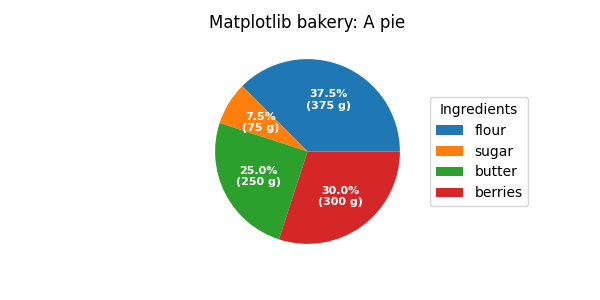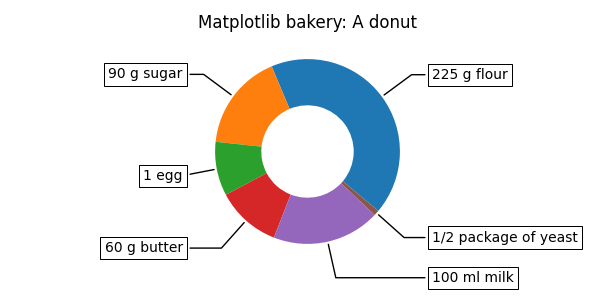笔记
单击此处 下载完整的示例代码
标记馅饼和甜甜圈#
欢迎来到 Matplotlib 面包店。我们将创建一个饼图和一个圆环图,并展示如何用 a 和 来标记
它们。pie methodlegendannotations
像往常一样,我们将首先定义导入并创建一个带有子图的图形。现在是馅饼的时候了。从馅饼配方开始,我们从中创建数据和标签列表。
我们可以为autopct参数提供一个函数,通过显示绝对值来扩展自动百分比标记;我们根据相对数据和所有值的已知总和计算后者。
然后我们创建饼图并存储返回的对象以备后用。返回元组的第一个返回元素是楔形列表。这些是
matplotlib.patches.Wedge补丁,可以直接用作图例的句柄。我们可以使用图例的bbox_to_anchor参数将图例定位在饼图之外。这里我们使用轴坐标和位置;即图例的左中心点将位于边界框的左中心点,从轴坐标跨越到。(1, 0, 0.5,
1)"center left"(1, 0)(1.5, 1)
import numpy as np
import matplotlib.pyplot as plt
fig, ax = plt.subplots(figsize=(6, 3), subplot_kw=dict(aspect="equal"))
recipe = ["375 g flour",
"75 g sugar",
"250 g butter",
"300 g berries"]
data = [float(x.split()[0]) for x in recipe]
ingredients = [x.split()[-1] for x in recipe]
def func(pct, allvals):
absolute = int(np.round(pct/100.*np.sum(allvals)))
return "{:.1f}%\n({:d} g)".format(pct, absolute)
wedges, texts, autotexts = ax.pie(data, autopct=lambda pct: func(pct, data),
textprops=dict(color="w"))
ax.legend(wedges, ingredients,
title="Ingredients",
loc="center left",
bbox_to_anchor=(1, 0, 0.5, 1))
plt.setp(autotexts, size=8, weight="bold")
ax.set_title("Matplotlib bakery: A pie")
plt.show()

现在是甜甜圈的时候了。从甜甜圈食谱开始,我们将数据转录为数字(将 1 个鸡蛋转换为 50 克),然后直接绘制馅饼。馅饼?等等……它会是甜甜圈,不是吗?好吧,正如我们在这里看到的,甜甜圈是一个馅饼,有一定width的楔形,这与它的半径不同。这很容易。这是通过wedgeprops参数完成的。
然后我们想通过 标记楔形
annotations。我们首先创建一些公共属性的字典,稍后我们可以将其作为关键字参数传递。然后我们遍历所有的楔子,并为每个
计算楔形中心的角度,
从中获得圆周上该角度的点的坐标,
确定文本的水平对齐方式,具体取决于点位于圆的哪一侧,
使用获得的角度更新连接样式,使注释箭头从甜甜圈向外指向,
最后,使用所有先前确定的参数创建注释。
fig, ax = plt.subplots(figsize=(6, 3), subplot_kw=dict(aspect="equal"))
recipe = ["225 g flour",
"90 g sugar",
"1 egg",
"60 g butter",
"100 ml milk",
"1/2 package of yeast"]
data = [225, 90, 50, 60, 100, 5]
wedges, texts = ax.pie(data, wedgeprops=dict(width=0.5), startangle=-40)
bbox_props = dict(boxstyle="square,pad=0.3", fc="w", ec="k", lw=0.72)
kw = dict(arrowprops=dict(arrowstyle="-"),
bbox=bbox_props, zorder=0, va="center")
for i, p in enumerate(wedges):
ang = (p.theta2 - p.theta1)/2. + p.theta1
y = np.sin(np.deg2rad(ang))
x = np.cos(np.deg2rad(ang))
horizontalalignment = {-1: "right", 1: "left"}[int(np.sign(x))]
connectionstyle = "angle,angleA=0,angleB={}".format(ang)
kw["arrowprops"].update({"connectionstyle": connectionstyle})
ax.annotate(recipe[i], xy=(x, y), xytext=(1.35*np.sign(x), 1.4*y),
horizontalalignment=horizontalalignment, **kw)
ax.set_title("Matplotlib bakery: A donut")
plt.show()

在这里,甜甜圈。但是请注意,如果我们要使用这个食谱,这些配料足以制作大约 6 个甜甜圈 - 制作一个巨大的甜甜圈未经测试,可能会导致厨房错误。
参考
此示例中显示了以下函数、方法、类和模块的使用: